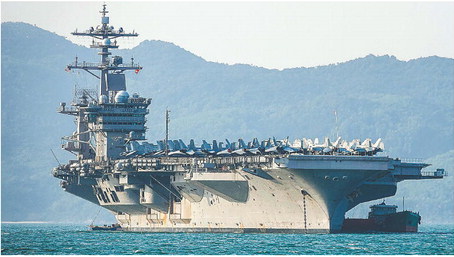Hawk Chinese Officer Suggests Sinking US
Aircraft Carriers To Intimidate The US |
1-1-19
|
 The aircraft carrier USS Carl Vinson anchored off the coast at Tien Sa Port, in Da Nang, Vietnam, on March 5, 2018.
The-US-supercarrier-Carl-Vinson
Luo Yuan, a Chinese military academic ranked as a rear admiral in the People's Liberation Army Navy (PLAN), has claimed that the United States could be brought to heel amid current disputes if two of its aircraft carriers were struck and destroyed by Chinese missiles.
In a Dec. 20 speech delivered in Shenzhen, China, Luo said that the ongoing Sino-U.S. trade war was "definitely not simply friction over economics and trade," but constituted a "prime strategic issue," Taiwan's Central News Agency (CNA) reported Dec. 23. According to Luo, the "five cornerstones of the United States" are the military, the dollar, talent, votes, and the presence of adversaries. Taking aim at the U.S. military, he said that "what the United States fears the most is taking casualties." Noting China's expanding anti-ship missile capabilities, he said that sinking one carrier could kill as many as 5,000 U.S. servicemen, or 10,000 if two vessels were destroyed. "We'll see how frightened America is," he said. The rear admiral, also a deputy head of the Chinese Academy of Military Sciences, delivered his speech at the 2018 Military Industry List summit. China's military, the People's Liberation Army (PLA), has large numbers of personnel who have no combat training or leadership roles, while holding high ranks. That includes political officers responsible for indoctrinating the PLA with Chinese Communist Party's (CCP) ideology, singers and dancers in so-called cultural work brigades, and jingoistic military academics such as Luo. Luo warned that the Trump administration's current hardline policy toward the Chinese regime is the only major issue that has bipartisan support in Washington. He criticized those Chinese who are prone to "self-criticism" or "reflection" amid the Sino-U.S. disputes. "But the problem isn't with us," he said. Instead, he believes that China should "use its strength to attack the enemy's shortcomings." "Attack wherever the enemy is afraid of being hit. Wherever the enemy is weak, just focus on develop-ing [an advantage]," he said. As part of this strategy, Luo said that China has three "bargaining chips" it could use against the United States. It could hurt U.S. soybean exports, which would have the greatest effect in Iowa, a key state in President Donald Trump's electoral campaign. Additionally, Beijing could also target what Luo called the "second-rate" U.S. automotive industry, and also aircraft manufacturing, since one of every three Boeing 737 airliners produced is sold to China. Recent negotiations suggest that Luo's ideas have been tried and aren't working. With demand surging, China has resumed its purchases of U.S. soybeans and lowered import duties on American cars as a gesture of goodwill. Reports also say that China will continue to increase its imports of civilian aircraft made in the United States. On Dec. 1, Chinese leader Xi Jinping met with Trump in Argentina on the sidelines of the G-20 summit. There, Xi is reported to have personally gone over a long list of U.S. demands and offered solutions for each. Following the meeting, the White House announced a 90-day halt to further escalation of the trade war, provided Beijing is able to make progress on implementing the necessary reforms for a fair deal on trade. On Dec. 18, Xi gave a speech at a high-profile Communist Party event in Beijing, implying that structural economic reforms were off the table. He also credited his political archrival, former Party leader Jiang Zemin, with having helped the regime with its historical path of economic reforms. But Dec. 29, Trump said he had a "long and good call" with Xi, and that good progress was being made on a deal. Leo Timm contributed to this report. Luo said that China has three "bargaining chips" it could use against the United States. |
Keeping an eye on Communist, Totalitarian China, and its influence both globally, and we as Canadians. I have come to the opinion that we are rarely privy to truth regarding the real goal, the agenda of China, it's ambitions for Canada [including special focus on the UK, US & Australia]. No more can we trust the legacy media as there appears to be increasing censorship applied to the topic of communist China. I ask why. Here is what I find.
Saturday, January 5, 2019
Hawk Chinese Officer Suggests Sinking US Aircraft Carriers To Intimidate The US
Subscribe to:
Post Comments (Atom)
No comments:
Post a Comment
Comments always welcome!